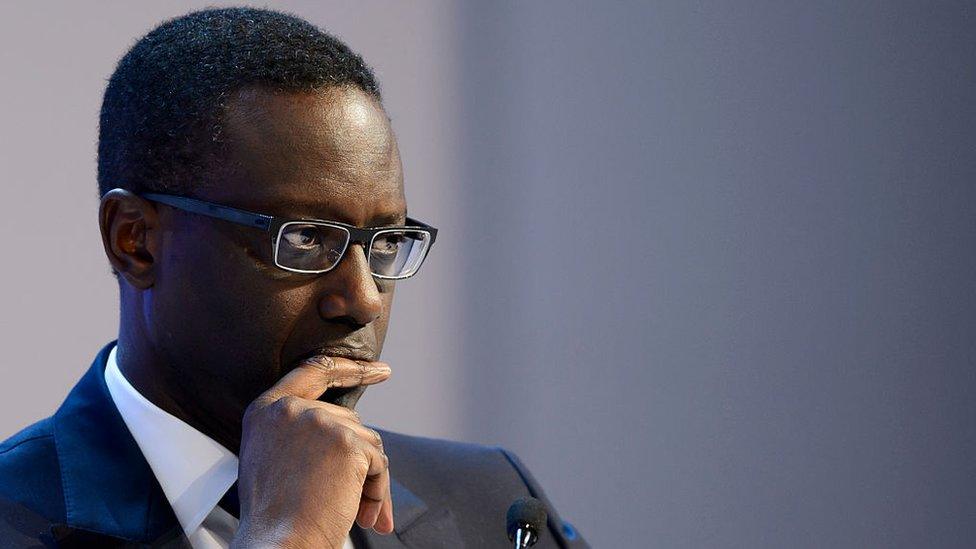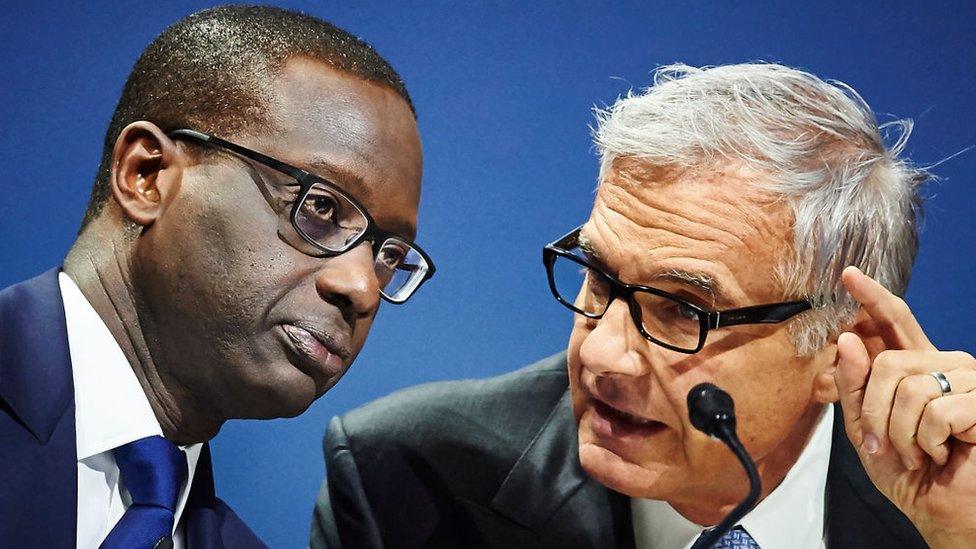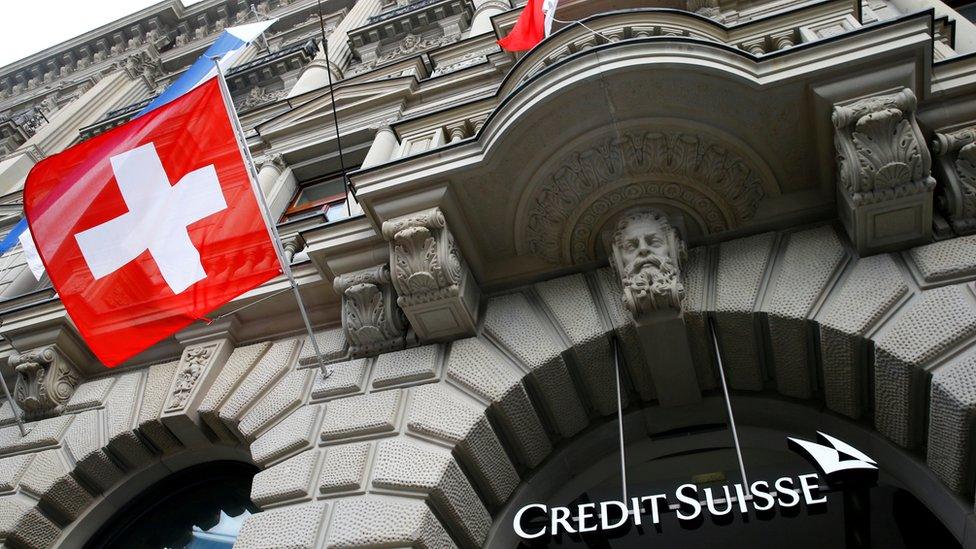Credit Suisse boss Tidjane Thiam quits after spying scandal
- Published

Mr Thiam joined Credit Suisse as chief executive in 2015
Credit Suisse boss Tidjane Thiam had to resign to protect the bank's reputation following a spying scandal, its chairman has said.
Mr Thiam is leaving the Swiss bank amid a reported power struggle with chairman Urs Rohner.
It emerged that two former employees had been put under surveillance, although Mr Thiam denied knowledge of the operations.
Mr Rohner said things "became more difficult" when a second case emerged.
Speaking to Swiss radio, Mr Rohner said Mr Thiam's departure was to maintain the bank's credibility, and denied there was ill-feeling between the two.
"At some point we realised that we couldn't get out of this situation unless we made a change and Tidjane Thiam understood that too," he said.
Credit Suisse's board has unanimously backed Mr Rohner, despite high profile pledges of support for Mr Thiam from key investors.
The surveillance scandal initially came to light in September when a probe found the bank's former chief operating officer, Pierre-Olivier Bouée, had hired private detectives to track its former head of wealth management, Iqbal Khan.
Credit Suisse later admitted its former human resources head Peter Goerke had also been tailed, prompting an investigation by Swiss financial watchdog FINMA.

Relations between Mr Thiam and Mr Rohner were said to have become strained
The bank's board unanimously accepted Mr Thiam's resignation.
This week a number of shareholders in Credit Suisse, such as Harris Associates, had backed Mr Thiam to stay on as chief executive and for Mr Rohner to go.
And on Wednesday, Mr Thiam posted a smiling photo of himself on Instagram with Credit Suisse's executive team.
However, the bank's board has thrown its support behind Mr Rohner.
Credit Suisse's lead independent director Severin Schwan said: "After careful deliberations, the board has been unanimous in its actions, as well as in reaffirming its full support for the chairman to complete his term until April 2021."
Mr Rohner told Swiss broadcaster SRF on Friday: "I have spoken with many [shareholders], also with the big ones. Many have confirmed to me that they support the course of the board of directors."
Allow Instagram content?
This article contains content provided by Instagram. We ask for your permission before anything is loaded, as they may be using cookies and other technologies. You may want to read Meta’s Instagram cookie policy, external and privacy policy, external before accepting. To view this content choose ‘accept and continue’.
Mr Thiam will leave on 14 February and is being replaced by Thomas Gottstein, who is head of the bank's Swiss business.
Relations between the chief executive and chairman had been increasingly strained following the spying scandal.
In a statement, Mr Thiam said: "I had no knowledge of the observation of two former colleagues.
" It undoubtedly disturbed Credit Suisse and caused anxiety and hurt. I regret that this happened and it should never have taken place."


The spying scandal, which involved Iqbal Khan, Credit Suisse's former head of wealth management being chased through the streets of Zurich, rocked the rather staid world of Swiss banking, overshadowing Tidjane Thiam's attempts to overhaul the bank.
Mr Thiam and Mr Khan had previously been close allies, with the wealth management business a cornerstone in the chief executive's turnaround plan. He pivoted the bank away from riskier trading activities, stabilising revenue.
The scandal, which emerged after Mr Khan defected to rival UBS, claimed the jobs of two senior Credit Suisse executives and resulted in a probe from the regulators - but Mr Thiam was cleared of involvement at the time.
But as the accusations escalated, a showdown between Mr Thiam and the board ensued. Urs Rohner triumphed: the man responsible for appointing Mr Thiam also determined his departure. Tidjane Thiam has for many years been a high profile figure in the financial world, even resorting to Instagram to put his message out, and denies any wrongdoing
The bank's largest shareholders had publicly called for him to be retained; now the challenge for Credit Suisse is to persuade shareholders that his successor, bank veteran Thomas Gottstein, can continue to restore its fortunes.

Mr Thiam has had an illustrious and varied career. The French Ivorian studied in France and worked in management consultancy before serving as Ivory Coast's Minister of Planning and Development, until a military coup led to him being placed under house arrest.
He later became boss of financial services firms Aviva Europe and Prudential before joining Credit Suisse five years ago.
Mr Thiam had attempted to overhaul the Swiss bank, including increased focus on Mr Khan's wealth management division.
While he had initially praised and promoted Mr Khan, there were reports a personal animosity had developed.
This intensified after Mr Khan redeveloped a property near Lake Zurich neighbouring that of his boss.
Media reports suggested there was an altercation between Mr Khan and Mr Thiam's girlfriend at a cocktail party held by the chief executive at his home, over trees planted on Mr Thiam's property.
Shortly after that Mr Khan announced his departure from Credit Suisse.
It later emerged private detectives were hired to track him due to fears he might poach clients when he started work at UBS.
Mr Khan, after noticing he was being tailed, had confronted the person observing him.
- Published1 October 2019
